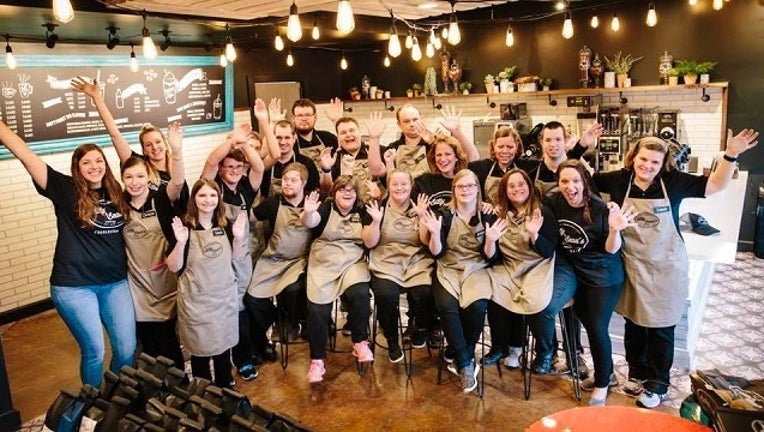Coffee shop hiring people with disabilities is ‘human rights movement,' owner says

A small mom-and-pop coffee shop in South Carolina is getting national attention because of its employees, all of whom have intellectual or cognitive disabilities. (Photo via Facebook/Bitty & Beau's Coffee)
(FOX NEWS) -- The smell of freshly brewed coffee fills a packed cafe situated on a cobblestone street in the coastal city town of Charleston, S.C. Baristas greet customers with smiles, sometimes hugs. At one point, customers and employees start dancing.
“I love parties, dance parties,” Sam Hazeltine, a barista, told Fox News as he danced behind the counter. “I got my groove on. I got my groove on…It’s fun. It’s a happy place.”
This small mom-and-pop coffee shop, Bitty and Beau’s Coffee, is getting national attention because of its employees, all of whom have intellectual or cognitive disabilities.
Two former Broadway performers opened the shop to open up opportunities for those who, because of physical or developmental delays, struggle finding jobs. Experts say more than 80 percent of individuals with disabilities are without a job.
“When we opened this coffee shop, we thought we would put a dent in the unemployment rate,” Bitty and Beau’s Coffee owner Ben Wright told Fox News. “What we figured out, what this really is and continues to be, is a human rights movement disguised as a coffee shop.”
The Wrights opened its first Bitty and Beau’s Coffee, named after their two youngest children with Down syndrome, in Wilmington, N.C. in 2016.
More than three dozen workers with disabilities, ranging from Down syndrome to autism, work at the café.
“I think people with developmental and intellectual disabilities (I.D.D)…are not valued like people who don’t have those disabilities,” Ben Wright said. “I think they’re looked upon as broken, as less than…less than human. And we are here to say, they are not.”
In 2018, the couple opened its second shop in Charleston, with nearly two dozen workers, serving up to 500 customers per day.
Hazeltine is one of those workers. Born with Down syndrome, he started working at the shop when it opened in March.
“I’m trying to help.” Hazeltine told Fox News.
The Wrights say they train their employees for about a week in a classroom setting, but they avoid a set curriculum to better accommodate their workers’ varying learning styles.
Once training within the classroom setting is complete, employees work alongside management for on-the-job training.
“People with and without disabilities should be working together, shoulder to shoulder, in every environment. That’s the point of what we are doing,” Ben Wright said.
Members from Family Connection, a non-profit that works to achieve family-centered care for those with disabilities, spoke to the barriers people with I.D.D. face when seeking employment.
“They are viewed as not having an ability vs. seeing them as or the capabilities that they do have to our society,” Family Connection Executive Director Amy Holbert told Fox News. “Not only does it improve morale in the workplace, but it also improves productivity.”
Research has shown corporations that hire people with I.D.D described them as dependable, reliable, productive and engaged, according to Holbert.
“Employment is great, but I believe integrated employment, meaningful employment, are what we need to strive for as employers and employees,” Holbert said.
The Wrights are currently scouting locations for their next shop, with the hope of having it up and running by the end of the year.
“We hope to have shops all over the country one day, where we employ people with disabilities,” Amy Wright said. “Also, bring people together with and without disabilities so they can see how their lives have value just like everybody else’s.”

